YYModel底层解析- Runtime
本人已迁移博客至掘进,以后会在掘进平台更新最新的文章也会有更多的干货,欢迎大家关注!!!https://juejin.im/user/588993965333309
这段时间一直在忙新的需求,没有时间来整理代码,发表自己技术博客,今天我们来看一下YYModel的底层解析以及如何使用,希望对大家有所帮助!
一 概述
概括
YYModel是一个轻量级的JSON模型转换库,它的思路非常清晰代码风格也很好,所以还是建议大家看一下底层实现的逻辑,也可以从源码加深对Runtime的理解。
简介
下面是YYModel第三方库的一些代码结构。
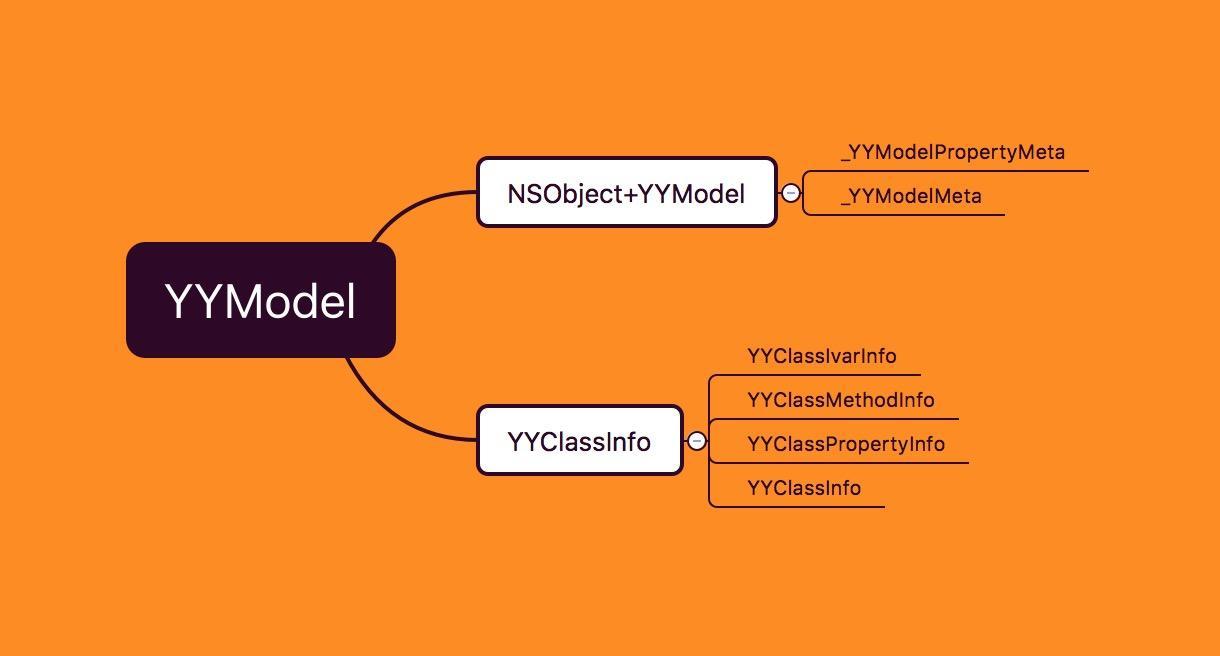
YYModel的总共文件只有5个文件
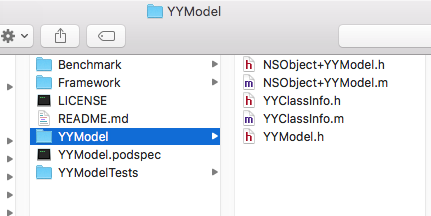
除掉YYModel.h之外,只剩下了YYClassInfo和NSObject+YYModel两个模块啦!
- YYClassInfo功能主要是将Runtime层级中的一些结构体封装到NSObject中调用;
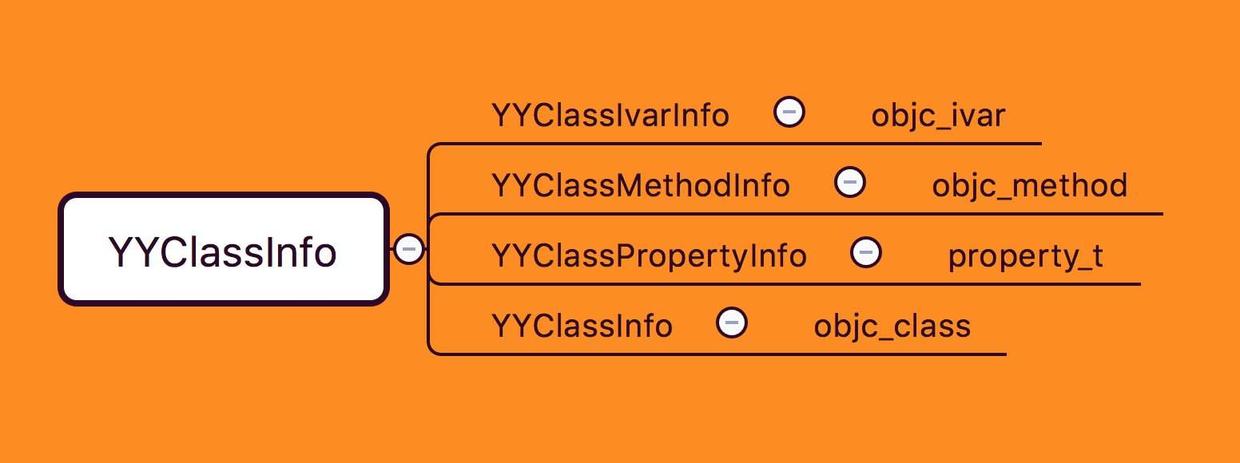
- NSObject+YYModel功能是提供调用的接口以及实现具体的模型转换逻辑。
前面已经讲到YYClassInfo主要功能是将Runtime层级的结构体封装到NSObject层级以便调用。下面是YYClassInfo与Runtime层级对比:

二、详细
1.YYClassIvarInfo
YYClassIvarInfo && objc_ivar
下面是YYClassIvarInfo
/** Instance variable information. */ @interface YYClassIvarInfo : NSObject @property (nonatomic, assign, readonly) Ivar ivar; ///< ivar opaque struct @property (nonatomic, strong, readonly) NSString *name; ///< Ivar's name @property (nonatomic, assign, readonly) ptrdiff_t offset; ///< Ivar's offset @property (nonatomic, strong, readonly) NSString *typeEncoding; ///< Ivar's type encoding @property (nonatomic, assign, readonly) YYEncodingType type; ///< Ivar's type /** Creates and returns an ivar info object. @param ivar ivar opaque struct @return A new object, or nil if an error occurs. */ - (instancetype)initWithIvar:(Ivar)ivar; @end
紧接着我们看一下Runtime的objc_ivar表示变量的结构体
struct objc_ivar { char * _Nullable ivar_name OBJC2_UNAVAILABLE; // 变量名称 char * _Nullable ivar_type OBJC2_UNAVAILABLE; // 变量类型 int ivar_offset OBJC2_UNAVAILABLE; // 变量偏移量 #ifdef __LP64__ // 如果已定义 __LP64__ 则表示正在构建 64 位目标 int space OBJC2_UNAVAILABLE; // 变量空间 #endif }
注:日常开发中,NSString类型的属性会用copy修饰,看上面YYClassIvarInfo中typeEncoding和name是用strong修饰。这是因为其内部先是通过Runtime方法拿到const char * 之后通过 stringWithUTF8String 方法之后转为 NSString 的。所以 NSString 这类属性在确定其不会在初始化之后出现被修改的情况下,使用 strong来修饰 做一次单纯的强引用在性能上是比 copy 要高的。
YYClassMethodInfo && objc_method
下面是YYClassMethodInfo
@interface YYClassMethodInfo : NSObject @property (nonatomic, assign, readonly) Method method; ///< 方法 @property (nonatomic, strong, readonly) NSString *name; ///< 方法名称 @property (nonatomic, assign, readonly) SEL sel; ///< 方法选择器 @property (nonatomic, assign, readonly) IMP imp; ///< 方法实现,指向实现方法函数的函数指针 @property (nonatomic, strong, readonly) NSString *typeEncoding; ///< 方法参数和返回类型编码 @property (nonatomic, strong, readonly) NSString *returnTypeEncoding; ///< 返回值类型编码 @property (nullable, nonatomic, strong, readonly) NSArray<nsstring *> *argumentTypeEncodings; ///< 参数类型编码数组 - (instancetype)initWithMethod:(Method)method; @end
YYClassMethodInfo则是对Rutime里面的objc_method的封装,紧接着我们看Runtime的objc_method结构体
struct objc_method { SEL _Nonnull method_name OBJC2_UNAVAILABLE; // 方法名称 char * _Nullable method_types OBJC2_UNAVAILABLE; // 方法类型 IMP _Nonnull method_imp OBJC2_UNAVAILABLE; // 方法实现(函数指针) }
YYClassPropertyInfo && property_t
YYClassPropertyInfo是对Runtime中property_t的封装
@interface YYClassPropertyInfo : NSObject @property (nonatomic, assign, readonly) objc_property_t property; ///< 属性 @property (nonatomic, strong, readonly) NSString *name; ///< 属性名称 @property (nonatomic, assign, readonly) YYEncodingType type; ///< 属性类型 @property (nonatomic, strong, readonly) NSString *typeEncoding; ///< 属性类型编码 @property (nonatomic, strong, readonly) NSString *ivarName; ///< 变量名称 @property (nullable, nonatomic, assign, readonly) Class cls; ///< 类型 @property (nullable, nonatomic, strong, readonly) NSArray<nsstring *> *protocols; ///< 属性相关协议 @property (nonatomic, assign, readonly) SEL getter; ///< getter 方法选择器 @property (nonatomic, assign, readonly) SEL setter; ///< setter 方法选择器 - (instancetype)initWithProperty:(objc_property_t)property; @end</nsstring *>
然后来看一下Runtime的property_t结构体
struct property_t { const char *name; // 名称 const char *attributes; // 修饰 };
YYClassInfo && objc_class
YYClassInfo封装了Runtime的objc_class,下面看一下YYClassInfo
YYClassInfo
@interface YYClassInfo : NSObject @property (nonatomic, assign, readonly) Class cls; ///< 类 @property (nullable, nonatomic, assign, readonly) Class superCls; ///< 超类 @property (nullable, nonatomic, assign, readonly) Class metaCls; ///< 元类 @property (nonatomic, readonly) BOOL isMeta; ///< 元类标识,自身是否为元类 @property (nonatomic, strong, readonly) NSString *name; ///< 类名称 @property (nullable, nonatomic, strong, readonly) YYClassInfo *superClassInfo; ///< 父类(超类)信息 @property (nullable, nonatomic, strong, readonly) NSDictionary<nsstring *, yyclassivarinfo *> *ivarInfos; ///< 变量信息 @property (nullable, nonatomic, strong, readonly) NSDictionary<nsstring *, yyclassmethodinfo *> *methodInfos; ///< 方法信息 @property (nullable, nonatomic, strong, readonly) NSDictionary<nsstring *, yyclasspropertyinfo *> *propertyInfos; ///< 属性信息 - (void)setNeedUpdate; - (BOOL)needUpdate; + (nullable instancetype)classInfoWithClass:(Class)cls; + (nullable instancetype)classInfoWithClassName:(NSString *)className; @end
objc_class
// objc.h typedef struct objc_class *Class; // runtime.h struct objc_class { Class _Nonnull isa OBJC_ISA_AVAILABILITY; // isa 指针 #if !__OBJC2__ Class _Nullable super_class OBJC2_UNAVAILABLE; // 父类(超类)指针 const char * _Nonnull name OBJC2_UNAVAILABLE; // 类名 long version OBJC2_UNAVAILABLE; // 版本 long info OBJC2_UNAVAILABLE; // 信息 long instance_size OBJC2_UNAVAILABLE; // 初始尺寸 struct objc_ivar_list * _Nullable ivars OBJC2_UNAVAILABLE; // 变量列表 struct objc_method_list * _Nullable * _Nullable methodLists OBJC2_UNAVAILABLE; // 方法列表 struct objc_cache * _Nonnull cache OBJC2_UNAVAILABLE; // 缓存 struct objc_protocol_list * _Nullable protocols OBJC2_UNAVAILABLE; // 协议列表 #endif } OBJC2_UNAVAILABLE;
注解:下面是Runtime关于class的知识
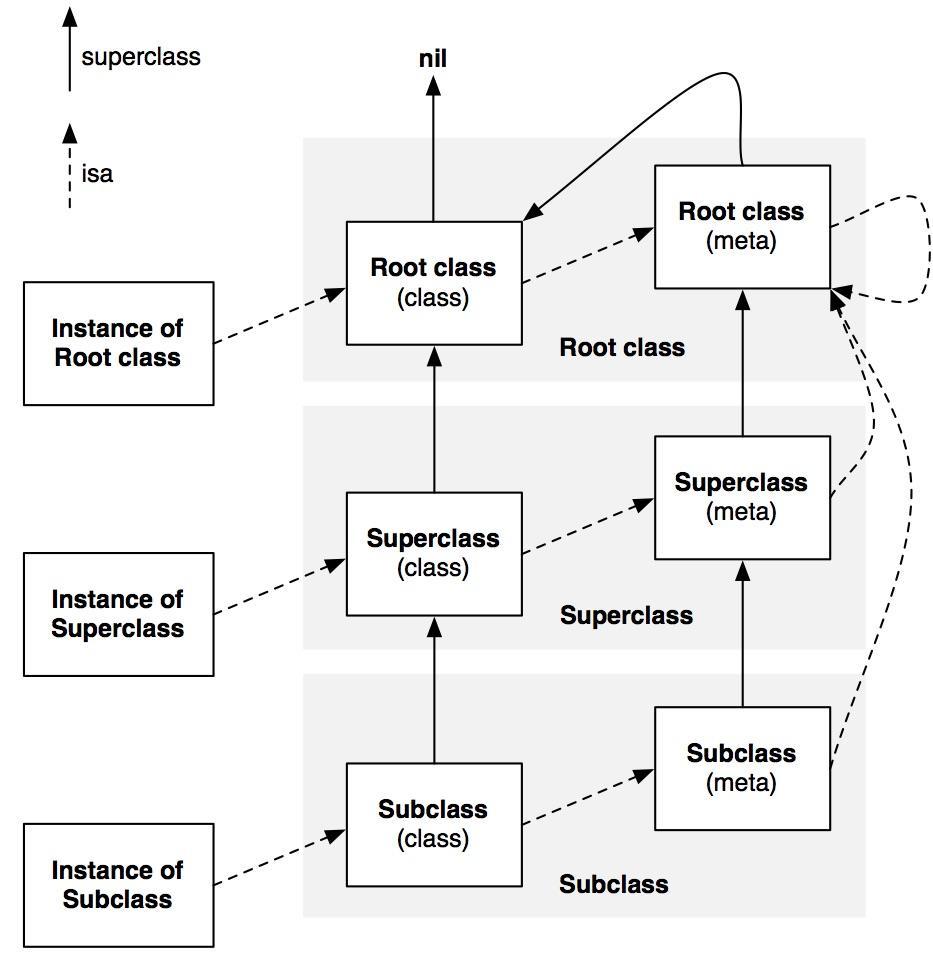
下面是对应的讲解。
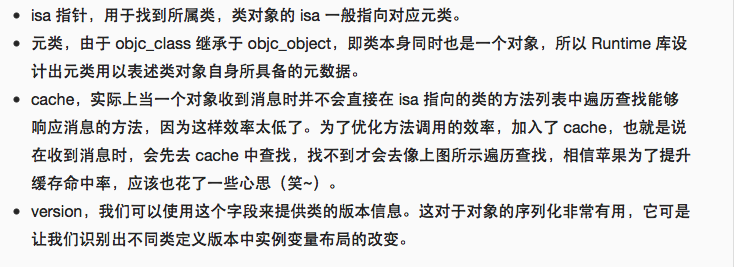
YYClassInfo 的初始化
+ (instancetype)classInfoWithClass:(Class)cls { // 判空入参 if (!cls) return nil; // 单例缓存 classCache 与 metaCache,对应缓存类和元类 static CFMutableDictionaryRef classCache; static CFMutableDictionaryRef metaCache; static dispatch_once_t onceToken; static dispatch_semaphore_t lock; dispatch_once(&onceToken, ^{ classCache = CFDictionaryCreateMutable(CFAllocatorGetDefault(), 0, &kCFTypeDictionaryKeyCallBacks, &kCFTypeDictionaryValueCallBacks); metaCache = CFDictionaryCreateMutable(CFAllocatorGetDefault(), 0, &kCFTypeDictionaryKeyCallBacks, &kCFTypeDictionaryValueCallBacks); // 这里把 dispatch_semaphore 当做锁来使用(当信号量只有 1 时) lock = dispatch_semaphore_create(1); }); // 初始化之前,首先会根据当前 YYClassInfo 是否为元类去对应的单例缓存中查找 // 这里使用了上面的 dispatch_semaphore 加锁,保证单例缓存的线程安全 dispatch_semaphore_wait(lock, DISPATCH_TIME_FOREVER); YYClassInfo *info = CFDictionaryGetValue(class_isMetaClass(cls) ? metaCache : classCache, (__bridge const void *)(cls)); // 如果找到了,且找到的信息需要更新的话则执行更新操作 if (info && info->_needUpdate) { [info _update]; } dispatch_semaphore_signal(lock); // 如果没找到,才会去老实初始化 if (!info) { info = [[YYClassInfo alloc] initWithClass:cls]; if (info) { // 初始化成功 // 线程安全 dispatch_semaphore_wait(lock, DISPATCH_TIME_FOREVER); // 根据初始化信息选择向对应的类/元类缓存注入信息,key = cls,value = info CFDictionarySetValue(info.isMeta ? metaCache : classCache, (__bridge const void *)(cls), (__bridge const void *)(info)); dispatch_semaphore_signal(lock); } } return info; }
下面总结一下初始化主要步骤:
- 首先创建单例缓存,类缓存和元类缓存;
- 使用dispatch_semaphore 保证缓存线程安全;
- 初始化操作之前首先缓存中查找是否已经向缓存中注册过的当前要初始化的YYClassInfo;
- 如果查找缓存对象,需要判断对象是否需要更新以及其他相关操作;
- 如果没有找到缓存对象,就开始初始化;
- 初始化成功之后,向缓存中注册YYClassInfo实例。
2.NSObject+YYModel

NSObject+YYModel在YYModel主要任务是利用YYClassInfo层级封装的类来执行JSON模型之间的转换逻辑。下面是NSObject+YYModel讲述的主要内容:
- 类型编码的解析
- 数据结构的定义
- 递归模型的转换
- 接口相关的代码
下面将部分讲解
数据结构的定义
NSObject+YYModel重新定义了两个类,来使用 YYClassInfo 中的封装。

_YYModelPropertyMeta
@interface _YYModelPropertyMeta : NSObject { @package NSString *_name; ///< 属性名称 YYEncodingType _type; ///< 属性类型 YYEncodingNSType _nsType; ///< 属性在 Foundation 框架中的类型 BOOL _isCNumber; ///< 是否为 CNumber Class _cls; ///< 属性类 Class _genericCls; ///< 属性包含的泛型类型,没有则为 nil SEL _getter; ///< getter SEL _setter; ///< setter BOOL _isKVCCompatible; ///< 如果可以使用 KVC 则返回 YES BOOL _isStructAvailableForKeyedArchiver; ///< 如果可以使用 archiver/unarchiver 归/解档则返回 YES BOOL _hasCustomClassFromDictionary; ///< 类/泛型自定义类型,例如需要在数组中实现不同类型的转换需要用到 /* property->key: _mappedToKey:key _mappedToKeyPath:nil _mappedToKeyArray:nil property->keyPath: _mappedToKey:keyPath _mappedToKeyPath:keyPath(array) _mappedToKeyArray:nil property->keys: _mappedToKey:keys[0] _mappedToKeyPath:nil/keyPath _mappedToKeyArray:keys(array) */ NSString *_mappedToKey; ///< 映射 key NSArray *_mappedToKeyPath; ///< 映射 keyPath,如果没有映射到 keyPath 则返回 nil NSArray *_mappedToKeyArray; ///< key 或者 keyPath 的数组,如果没有映射多个键的话则返回 nil YYClassPropertyInfo *_info; ///< 属性信息,详见上文 YYClassPropertyInfo && property_t 章节 _YYModelPropertyMeta *_next; ///< 如果有多个属性映射到同一个 key 则指向下一个模型属性元 } @end
_YYModelMeta
@interface _YYModelMeta : NSObject { @package YYClassInfo *_classInfo; /// Key:被映射的 key 与 keyPath, Value:_YYModelPropertyMeta. NSDictionary *_mapper; /// Array<_YYModelPropertyMeta>, 当前模型的所有 _YYModelPropertyMeta 数组 NSArray *_allPropertyMetas; /// Array<_YYModelPropertyMeta>, 被映射到 keyPath 的 _YYModelPropertyMeta 数组 NSArray *_keyPathPropertyMetas; /// Array<_YYModelPropertyMeta>, 被映射到多个 key 的 _YYModelPropertyMeta 数组 NSArray *_multiKeysPropertyMetas; /// 映射 key 与 keyPath 的数量,等同于 _mapper.count NSUInteger _keyMappedCount; /// 模型 class 类型 YYEncodingNSType _nsType; // 忽略 ... } @end
三、使用
1.简单Model与JSON相互转换
#import <Foundation/Foundation.h> //"time":"2018-07-04 12:13:52", //"ftime":"2018-07-04 12:13:52", //"context":"快件已签收 签收人: 他人代收 感谢使用圆通速递,期待再次为您服 @interface IOALogisticsDetailModel : NSObject @property(nonatomic,copy)NSString *time; @property(nonatomic,copy)NSString *ftime; @property(nonatomic,copy)NSString *context; @end #import "IOALogisticsDetailModel.h" @implementation IOALogisticsDetailModel @end
下面是运用
- (NSArray <IOALogisticsDetailModel *>*)setupOrderWithArray:(NSArray <NSDictionary *>*)array{ NSMutableArray <IOALogisticsDetailModel *>*modelArray = [NSMutableArray arrayWithCapacity:array.count]; for(NSDictionary *dic in array){ IOALogisticsDetailModel *model = [IOALogisticsDetailModel yy_modelWithDictionary:dic]; if (!model) continue; [modelArray addObject:model]; } return modelArray; }
红色部分就是应用。
如果需要Model转为JSON如下
#import <Foundation/Foundation.h> @interface IOAOrderAftersaleRequestModel : NSObject @property(nonatomic,copy)NSString *order_sn; @property(nonatomic,copy)NSString *rec_id; @property(nonatomic,copy)NSString *is_type; @property(nonatomic,assign)NSInteger refund_count; @property(nonatomic,copy)NSString *content; @property(nonatomic,copy)NSString *return_attachs; @property(nonatomic,copy)NSString *shop_id; @property(nonatomic,copy)NSString *reason; @property(nonatomic,assign)float total; @end #import "IOAOrderAftersaleRequestModel.h" @implementation IOAOrderAftersaleRequestModel @end
下面是运用
//提交退货商品 @interface IOAOrderAftersaleRequest:IOARequest @property (nonatomic,strong)IOAOrderAftersaleRequestModel *requestModel; @end //提交退货商品 @implementation IOAOrderAftersaleRequest - (id)requestArgument{ NSMutableDictionary *dic = [IOAApiManager getParametersWithService:@"App.Order.SetOrderAftersaleGoodsrefundsList"]; NSDictionary *temDic = [self.requestModel yy_modelToJSONObject]; [dic addEntriesFromDictionary:temDic]; return dic; }
2.Model属性名与JSON中key不同
// JSON: { "n":"Harry Pottery", "p": 256, "ext" : { "desc" : "A book written by J.K.Rowing." }, "ID" : 100010 } // Model: @interface Book : NSObject @property NSString *name; @property NSInteger page; @property NSString *desc; @property NSString *bookID; @end @implementation Book //返回一个 Dict,将 Model 属性名对映射到 JSON 的 Key。 + (NSDictionary *)modelCustomPropertyMapper { return @{@"name" : @"n", @"page" : @"p", @"desc" : @"ext.desc", @"bookID" : @[@"id",@"ID",@"book_id"]}; }
3.Model包含Model
// JSON { "author":{ "name":"J.K.Rowling", "birthday":"1965-07-31T00:00:00+0000" }, "name":"Harry Potter", "pages":256 } // Model: 什么都不用做,转换会自动完成 @interface Author : NSObject @property NSString *name; @property NSDate *birthday; @end @implementation Author @end @interface Book : NSObject @property NSString *name; @property NSUInteger pages; @property Author *author; //Book 包含 Author 属性 @end @implementation Book @end
下面在我们项目中的使用

#import <Foundation/Foundation.h> #import "IOAOrder.h" @interface IOAOrderGroup : NSObject @property(nonatomic,copy)NSString *order_id; @property(nonatomic,copy)NSString *parent_sn; @property(nonatomic,copy)NSString *order_sn; @property(nonatomic,copy)NSString *order_status; @property(nonatomic,copy)NSString *refund_status; @property(nonatomic,copy)NSString *return_status; @property(nonatomic,copy)NSString *pay_status; @property(nonatomic,copy)NSString *total_amount; @property(nonatomic,copy)NSString *company_name; @property(nonatomic,copy)NSString *company_logo; @property(nonatomic,copy)NSString *shop_id; @property(nonatomic,copy)NSString *stroe_id; @property(nonatomic,copy)NSString *order_amount; @property(nonatomic,assign)int store_id; @property (nonatomic,strong)NSArray<IOAOrder *> *goods_list; @end #import "IOAOrderGroup.h" #import <YYModel/YYModel.h> @implementation IOAOrderGroup + (NSDictionary *)modelContainerPropertyGenericClass{ return @{@"goods_list":[IOAOrder class]}; } @end #import <Foundation/Foundation.h> @interface IOAOrder : NSObject @property(nonatomic,copy)NSString *rec_id; @property(nonatomic,copy)NSString *order_id; @property(nonatomic,copy)NSString *brand_name; @property(nonatomic,copy)NSString *goods_id; @property(nonatomic,copy)NSString *goods_name; @property(nonatomic,copy)NSString *goods_sn; @property(nonatomic,copy)NSString *goods_num; @property(nonatomic,copy)NSString *market_price; @property(nonatomic,copy)NSString *goods_price; @property(nonatomic,copy)NSString *cost_price; @property(nonatomic,copy)NSString *member_goods_price; @property(nonatomic,copy)NSString *total_price; @property(nonatomic,copy)NSString *give_integral; @property(nonatomic,copy)NSString *spec_key; @property(nonatomic,copy)NSString *unit; @property(nonatomic,copy)NSString *spec_key_name; @property(nonatomic,copy)NSString *bar_code; @property(nonatomic,copy)NSString *is_comment; @property(nonatomic,copy)NSString *prom_type; @property(nonatomic,copy)NSString *prom_id; @property(nonatomic,copy)NSString *is_send; @property(nonatomic,copy)NSString *delivery_id; @property(nonatomic,copy)NSString *add_time; @property(nonatomic,copy)NSString *update_time; @property(nonatomic,copy)NSString *image_url; @property(nonatomic,assign)BOOL selected; @end #import "IOAOrder.h" @implementation IOAOrder @end
4.白名单黑名单
@interface User @property NSString *name; @property NSUInteger age; @end @implementation Attributes // 如果实现了该方法,则处理过程中会忽略该列表内的所有属性 + (NSArray *)modelPropertyBlacklist { return @[@"test1", @"test2"]; } // 如果实现了该方法,则处理过程中不会处理该列表外的属性。 + (NSArray *)modelPropertyWhitelist { return @[@"name"]; } @end
YYModel的核心是通过runtime获取结构体中得Ivars的值,将此值定义为key,然后给key赋value值,所以我们需要自己遍历容器(NSArray,NSSet,NSDictionary),获取每一个值,然后KVC。




